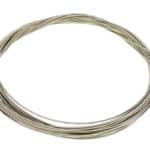If you have been playing guitar for a while, you probably heard or read somebody rating about the “action” of a guitar.
But what does that actually mean?
Well, by action guitarists refer to the actual height at which the strings of the instrument float with respect to the fingerboard.
Usually, more vintage guitars tend to have higher string action, while more modern ones’ strings are usually set up lower.
Slide players, as a particular case, play almost exclusively with high action so the slide itself doesn’t get stuck with the frets and creates unwanted sounds.
String height or action definitely affects playing speed. Though string height is a personal preference, it can cause massive swings in your playing speed. This is because lower strings require less applied force to be fretted and make a note ring. However, lower action can lead to issues like fret buzz.
If you want to dive deeper into this topic, I suggest you stick around with me for a while.
In this article, I will tell you all you need to know about how string action can affect the playability of your instrument.
Are you ready to get started?
Let’s go!
Will a lower string action make me play faster?
A lower string action will surely help aid in playing quickly, but not the only thing required to play fast!
A low string height will make it guitar easier on the hands, require less pressure and in most cases will make it less involved to fret notes quicker.
String height like many things related to guitar is in many cases a personal preference and changes from player to player (to a certain degree).
Objectively, however, we can all agree that having to exert less force to get an outcome will compound on less energy being required to do something.
If that something we do is playing the guitar, economizing the energy output required to get sound out of the instrument will surely be the best path towards playing speed.
However, not all players want to play as fast as they could, and a lot prefer the feeling of having to dig in harder into the fretboard to achieve their sound.
Are there any other upsides of using a low string action?
Setting up your guitar with a lower action will not only aid you in playing lightning-fast licks.
A lower string height will produce an overall more enjoyable playing experience for many players.
It is important to consider how it might affect the technical side of your playing.
Lower strings are in most cases easier to bend, easier for pulls-offs/hammer-ons, and make fretting harder chords easier.
This might be the world for a lot of guitarists that struggle with these techniques, and I would probably recommend it especially for beginners.
However, it’s important to have your instrument set up correctly to avoid any issues.
Why do some players prefer a higher string action?
Players who don’t usually play fast runs might prefer a higher action to prevent fret buzz and is also common with slide guitar players playing in open tunings.
Some players prefer the feel of having to dig into the fretboard a bit to make notes ring.
Also, players with very strong hands might press with too much force and make notes go out of tune with a lower action.
This is particularly a problem when your instrument has bigger frets, which are very common on modern instruments.
When you fret the string you may apply enough force to make it sit against the fret and be able to ring, however, if you press hard enough, you could start bending the string behind the fret, making its pitch go higher.
Players with very strong hands might face this issue when playing guitars with a very low string action.
How can you lower the action on your guitar?
For most guitars, it’s as quick as adjusting the saddles on the bridge with a flat head screwdriver or allen key.
Try to find a comfortable low point that doesn’t cause any buzz on the guitar and check the intonation on each string.
Ideally, you want your 12 frets to be in tune, and no fret buzz anywhere, best places to check are frets 1-5 and 13-17.
But if this all sounds like gibberish to you, there’s nothing to worry about.
Nobody was born knowing it all.
And hey, even some advanced players hate tinkering with their instruments.
Thankfully there probably is a guitar tech near you to help you out.
If in doubt, take your guitar to a technician
If you don’t know how to set up your guitar, take it to a tech.
If it’s nothing more than a simple setup, it shouldn’t cost you more than $50-100 and a professional guitar tech will make your guitar feel better than ever.
Something like a pro setup is always worth it in the end and should last many many restrings before needing another setup.
A professional setup will help you achieve the perfect string height for your playstyle, as long as you can communicate it clearly to the tech.
Also, a professional will ensure your instrument doesn’t suffer from fret buzz when its action is lowered, and that its intonation is spot on.
Is it a good idea to practice with a higher string action?
Not really.
To practice stamina just play for a long period of time.
You should practice in the conditions you will be performing, it’s all about quality practice time that will make actual changes in your position.
Practice comfortably and practice as often as possible.
Time, experience, and repetition are what will make you a better player.
Forcing yourself into uncomfortable conditions can only hinder your learning process, and in the extreme even hurt you.
Using thicker strings or an exaggeratedly high string action could make you overstress your fretting hand due to the extra force required and make you develop tendinitis.
If anything you are doing while practicing hurts, just stop.
Take some air, relax your muscles and try again later.
Does string action influence tone?
String height can cause a slight variation in tone, though it isn’t always a massive difference.
That said, you might notice better sounding playing just purely based on the comfort and ease of a well-setup guitar.
If the action of your guitar prevents you from playing what you hear in your head or makes you have to struggle with the instrument rather than enjoy the experience, your tone will be affected.
This is a cliche, but tone is in the fingers, and although modifying your guitar action will not have the obvious impact like changing pickups have, if you pay enough attention you will probably hear the difference between an uncomfortable action and the one that’s just right for you.

Hello there, my name is Ramiro and I’ve been playing guitar for almost 20 years. I’m obsessed with everything gear-related and I thought it might be worth sharing it. From guitars, pedals, amps, and synths to studio gear and production tips, I hope you find what I post here useful, and I’ll try my best to keep it entertaining also.





